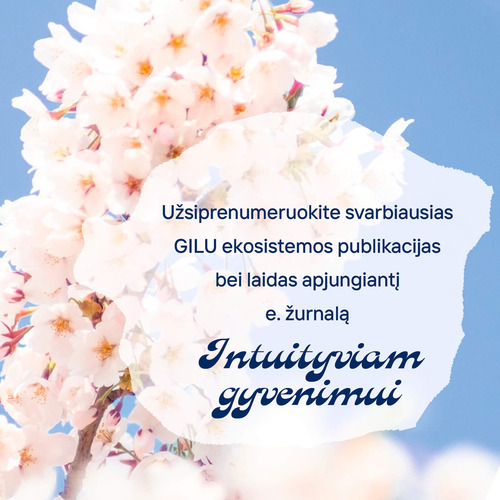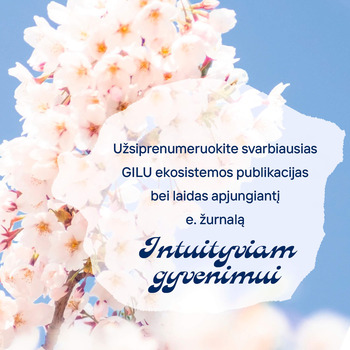Publications
- Home
- Publications
- Neuroscientist on habits: how to change them and how do hormones influence them?
Neuroscientist on habits: how to change them and how do hormones influence them?
2022 10 29LRT.lt
A habit is an automatic chain of events formed by repeating the stimulus-action-result sequence. The likelihood of forming a habit depends on the outcome - how important and enjoyable it is to us.
Importance is reflected in motivation, which can be related to biological needs (food, water, sleep, etc.) and social needs (connection, recognition, earnings, etc.). And pleasure is directly linked to emotion - the more pleasurable the outcome, the more we will repeat the sequence of events until it becomes a habit.
How does neuroscience study human habits, volition, decision-making and intuition? We talk to neuroscientist Dr Ramune Grikšienė about these topics.
- Can you give us an example of how you or someone you know has learned to change a habit that was preventing you from making a necessary change?
- To say that I have learnt to change a habit is really too bold - habits come back. But I am learning. For example, I am currently trying to break the habit of using my phone while driving, where my hand automatically goes towards my phone when I stop at traffic lights.
First I tried to understand why I do it. I realised that, like probably many people, I cannot get out of the flow of information and just sit quietly for the next minute until the colour of the traffic lights changes. Having realised this, I deliberately stop this action, and instead, to avoid the "hunger" of information, I concentrate on what is being said on the radio (I usually listen to the BBC when I am driving, where there is certainly something to listen to). Sometimes it works, sometimes it doesn't (smiles).
Perhaps the most attractive feature of the human species is that we have a large and well-developed structure - the cerebral cortex - which can be very useful when used for its intended purpose. It enables us to make conscious decisions to do or not to do something. So while habits are based on automatic stimulus-action-result sequences, by making a conscious decision we can break and change unwanted sequences.
- What role do hormones play in habit formation?
- Let's recall the same sequence of habits: stimulus-action-result. Hormones shape the internal state of our body and determine how receptive and sensitive we are to different stimuli, such as the sight, smell and calorie content of food; sexual stimuli; social challenges, etc. Hormones can modulate action: they can change our motivation, slow us down or, conversely, make us challenge ourselves.
Finally, a habit requires an outcome, and the assessment of whether or not there is an outcome can also depend on hormones - sometimes we think we have too little and sometimes we think we have too much.
- Do men and women tend to make decisions differently?
- The short, general answer is no. Decision-making is highly dependent on the type of decision, for example, whether it is financial, social, health, safety, etc. It also depends on a person's state of mind and personality traits, but not on gender.
On the other hand, there are factors that are strongly involved in decision-making, such as risk-taking, anxiety. And although these words may sound stereotypical today, I would venture to say that, on average, women tend to take fewer risks and have higher levels of anxiety than men. Accordingly, this may lead to different decisions, and we would then say that men and women have made different decisions in certain situations.
- Since this column is called "Intuitive Life", what does this phrase mean to you?
- Personally, I associate it with the idea that sometimes, especially when we feel that we want something very badly, we need to think less, fear less or doubt less, but just let things happen. Experience tells us that very often things turn out even better than we could have imagined.
- Intuition keeps reminding us that we are all biased, full of all kinds of learned patterns. What does neuroscience say about the intuition factor?
- Neuroscience says that intuition is based on the baggage of knowledge we accumulate through learning and repetition. Studies show that experts in various fields (gambling, mathematics, medicine, economics, etc.) who make the right decisions very quickly, without thinking for long periods of time (from intuition), have acquired this ability through a combination of conscious knowledge and/or unconscious practice (repetition).
Interestingly, experts often cannot explain how/why they made such quick and correct (intuitive) decisions. This is in line with brain imaging studies showing that while we are learning (new to the field), we are actively thinking and using the highest level areas of the brain (the cerebral cortex) to make a decision, but once we have reached a certain level of proficiency, the quick and correct decision is automatically born from the 'triggering' of structures deep in the subconscious.
An example that everyone can understand would be social relations. The amount of conscious knowledge in this area is often limited, but unconscious learning is continuous, from birth, whenever we interact or observe communication. In this way, we all become experts in the field and are able to make decisions automatically and intuitively. Of course, it should not be assumed that intuitive judgements, decisions or behaviour will always be correct.











